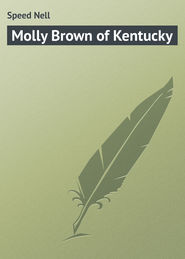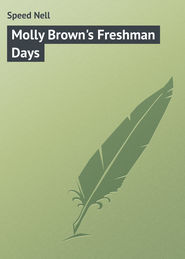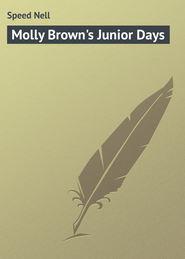По всем вопросам обращайтесь на: info@litportal.ru
(©) 2003-2024.
✖
Molly Brown's Post-Graduate Days
Настройки чтения
Размер шрифта
Высота строк
Поля
Mrs. Brown explained that Aunt Clay had made things pretty hot for her hands, but so far there had been no other fire. She welcomed Professor Green to Chatsworth and called the grinning Buck to take his suitcase to the cottage porch. Judy wondered at her calm manner and at her saying nothing to Ernest about their being so frightened, not realizing that one hint of the trouble would have sent Ernest off into a rage, when he might have reprimanded the negroes and all the good work of the buttermilk have been undone. Molly was pale and Professor Green, ever watchful of her, asked Judy to give him an account of the matter, which she did in such a graphic manner that he, too, turned pale to think of the danger those dear ladies had been in. He made himself at home by making himself useful, and helped Molly to carry back into the kitchen the empty glasses and plates from the feast of the hungry darkeys. She laughingly handed him a great, iron pot in which cabbage had been cooked.
“I am wondering what Aunt Mary will say about her cabbage. Mother sent me into the house to get all available food, when she realized that the hands were simply hungry and that food would be the best thing to quell their rage. Aunt Mary had this huge pot of cabbage on the back of the range; she said in case Lewis jolted down the lunch she was going to eat at the basket funeral she would have it cooked in readiness. The poor dogs will have to go hungry, too, or have some more corn bread cooked for them. I found this big pan full of what we call dog-bread, made from scalded meal and salt and bacon drippings, baked until it is crisp. The men were crazy about it with pot liquor poured over it. You can see for yourself how they licked their platters clean.”
“The Saxon word ‘lady’ means bread-giver, but I think that you and your mother have given it a new significance, and the dictionaries will have to add, ‘Dispenser of cabbage and buttermilk and dog-bread.’”
More wheels, and Aunt Mary and Lewis, with Ca’line much rumpled and asleep on the front seat, her shoes and stockings in her lap and her bare feet propped gracefully on the dashboard, had returned. Aunt Mary was much excited.
“What’s all dis doin’? Who was all dem niggers I seen a-streakin’ crost the fiel’s? Buck Jourdan, ain’t that you I see hidin’ behine that tree? I thought I hearn the farm bell as we roun’ed the Pint, but Lewis lowed ’twas over to Miss Sary Clay’s. Come here, Buck, an’ he’p me out’n dis here waggin. You needn’t think you kin hide from me, when I kin see the patch on yo’ pants made outen the selfsame goods I gib yo’ ma to make some waistes out’n, two years ago come next Febuway.” Buck came sheepishily forward to help his old aunt out of the vehicle. “Nex’ time you wan’ ter hide from me you’d better make out to grow a leettle leaner, or fin’ a tree what’s made out to grow some wider so’s you won’t stick out beyant it. What you been doing, and who’s been a-mashin’ down ole Miss’s grass, and what’s my little Miss Molly baby a-doin’ workin’ herself to death ag’in to-day?”
Buck endeavored to explain his appearance, and told the story of the strike at Mrs. Clay’s and how they were just passing through Mrs. Brown’s yard when she had come out and invited them all to dinner. His story was so plausible and his voice so soft and manner so wheedling, that Professor Green, who overheard the conversation, was much amused, and had he not already got the incident from Judy might have believed Buck, so convincing were his words and manner. Not so Aunt Mary, who had partly raised the worthless Buck and knew better than anyone how he could use his silver tongue to lie as well as tell the truth, but preferred the former method.
“Now, look here, you Buck Jourdan, you ain’t no count on Gawd’s green yearth ‘cep to play the banjo. What you been doin’ hirin’ yo’self out to Miss Sary Clay, jes’ like you ain’t never know’d that none of our fambly don’ never work fer none er hern? Yo’ ma befo’ you an’ yo’ gran’ma befo’ her done tried it. Meanin’ no disrespect to the rest er the Carmichaels, der’s the ole sayin’, ‘What kin you expec’ from a hog but a grunt?’ I knows ‘thout goin’ in my kitchen that Miss Molly done gib all you triflin’ niggers my pot er cabbage an’ the dog-bread I baked fer those houn’s an’ bird dogs what ain’t no mo’ count than you is, ‘cept’n they can’t play the banjo.”
“Buck Jourdan, is that you?” said Ernest, coming forward and interrupting Aunt Mary’s tirade. “I am going to get Miss Molly’s banjo and you can sit down and give us some music. I haven’t heard a good tune since I went West.”
Buck, glad to escape any farther tongue lashing from his relative, and always pleased to play and sing, tuned the banjo and began:
“‘Hi,’ said the ’possum as he shook the ‘simmon tree,
‘Golly,’ said the rabbit; ‘you shake ’em all on me.’
An’ they went in wif they claws, an’ they licked they li’l paws,
An’ they took whole heaps home to they maws.”
After several stanzas sung in a soft melodious voice, Buck, at Molly’s request, gave them, to a chanting recitative the following song, composed by a friend of Buck’s, and worthy to be incorporated in American folk-lore, so Professor Green laughingly assured Mrs. Brown.
THE MURDER OF THE RATTAN FAMILY
“One evening in September, in eighteen ninety-three,
Jim Stone committed a murder, as cruel as it could be.
’Twas on the Rattan family, while they were preparing for their bed.
Jim Stone, he rapped upon the door, complaining of his head.
The first was young Mrs. Rattan. She come to let him in.
He slew her with his corn knife – that’s where his crime begin.
The next was old Mrs. Rattan. Old soul was feeble and gray.
Truly she fought Jim Stone a battle till her strength it give way.
The next was the little baby. When he, Jim Stone did see,
He raised up in his cradle. ‘Oh! Jim Stone, don’t murder me!’
Next morning when he was arrested – wasn’t sure that he was the one.
Till only a few weeks later he confessed to the crime he done.
They took him to Southern Prison, which they thought was the
safetes’ place.
When they marched him out for trial, he had a smile upon his face.
And after he was sentenced, oh! how he did mourn and cry.
One day he received a letter, saying his daughter was bound to die.
Next morning he answered the letter and in it he did say,
‘Tell her I’ll meet her there in Heaven, on the sixteenth of Februway.’
They led him upon the scaffold with the black cap over his head.
And he hung there sixteen minutes ‘fore the doctors pronounced
him dead.
Now wouldn’t it have been much better if he’d stayed at home
with his wife,
Instead of keeping late hours, and taking that family’s life?”
CHAPTER VII. – PICTURES ON MEMORY’S WALL
The next week was a very quiet and peaceful one at Chatsworth. There had been so many excitements, with burglars and negro uprisings and what not, that Molly was afraid her visitors would think Kentucky deserved the meaning the Indians attached to it – “the dark and bloody battle-ground.”
Ernest, home for a vacation from his labors in the West, endeavored to keep Judy from missing the attentions of Kent, who was back at his grind in Louisville in the architect’s office, and did not get home each day until time for a late supper. Judy liked Ernest very well, as she did all of the Browns, but Kent and Molly were her favorites still, and the evenings were the best of all when Kent came home and, as he put it, “relieved Ernest.”
Molly found herself on easier terms with Professor Green than she had ever imagined possible. If he did not consider her quite an old lady, she at least was beginning to look upon him as not such a very old gentleman. He played what Kent designated as a “cracker-jack” game of tennis, and turned out to be as good a horseman as the Brown boys themselves.
“If he only had a little more hair on his forehead,” thought Molly, “he would look right young.”
Aunt Mary was the unconscious means of consoling her for his lack of hair. “Honey, I likes yo’ teacher mo’n any Yankee I ever seed. He’d oughter rub onions on his haid to stimilate the roots. Not but what he ain’t han’some, baldish haid an’ all, with them hones’ eyes an’ that upstandin’ look. I done took notice that brains don’ make the best sile to grow ha’r on an’ lots er smart folks is baldish. Mindjer, I wouldn’ go so fer as to say bald haided folks is all smart. It looks like some er them is so hard-haided the ha’r can’t break th’ough the scalp.”
Of course, the first day at Chatsworth he had to be taken out to view his possessions, the two acres of orchard land. It was a possession for any man to be proud of. It lay on the side of a gently sloping hill covered with blue grass and noble, venerable, twisted apple trees, that Molly said reminded her of fine old hands that showed hard, useful work.
“And these trees always have done good work. You know my father called these his lucky acres. He was always certain of an income from these apples. The trees have been taken care of and trimmed and not allowed to rot away as some of the old orchards around here have, Aunt Clay’s, for instance. She is so afraid of doing something modern that she refused to spray her trees when the country was full of San José scale, and in consequence lost her whole peach orchard and most of her apples. This is where our ‘castle’ used to be.”
They were in a grassy space near the middle of the orchard, where a stump of an old tree was still standing. The land, showing a beautiful soft contour, sloped to the worm fence at the foot of the hill, where the grass changed its green to a brighter hue and a beautiful little stream sparkled in the sun.
“All of us, even Sue, who is not given to such things, cried when in a big wind storm our beloved castle was twisted off of its roots. It was a tree made for children to play in, with low spreading branches and great crotches, the limbs all twisted and bent and one of them curving down so low you could sit in it and touch your feet to the ground. We had our regular apartments in that tree and kept our treasures in a hole too high up for thieves to have any suspicion of it. It was so shady and cool and breezy that on the hottest day we were comfortable and often had lunch here. We played every kind of game known to children and made up a lot more. ‘Swiss Family Robinson’ when they went to live up the tree was our best game. I remember once Kent gathered a lot of peach-tree gum and ruined my slippers trying to make rubber boots out of them as the father in Swiss Family Robinson did. Our castle had wonderful apples on it, too. They grew to an enormous size, and if any of them were ever allowed to get really ripe they turned pure gold and tasted – oh, how good they did taste.”
Edwin Green listened, enchanted at Molly’s description of her childhood and the beloved play-house. He half shut his eyes and tried to picture her as a little girl in a blue sun-bonnet – of course she must have had a blue bonnet – climbing nimbly up the old apple tree, entering as eagerly into the game of Swiss Family Robinson as she was now playing the game of life, even letting her best little slippers be gummed over to play the game true. He had a feeling of almost bitter regret that he hadn’t known Molly as a little girl. “She must have been such a bully little girl,” thought that highly educated teacher of English.
“Miss Molly, do you think that this would be the best place to build my bungalow? Place it right here where your castle stood? Maybe I could catch some of the breezes that you used to enjoy; and perhaps some of the happiness that you found here was spilled over and I might pick it up. It could not be so beautiful as your tree castle, but it is my ‘Castle in the Air.’ If I put it here I should not have to sacrifice any of the other trees; there is room enough where your old friend stood for my modest wants. Would it hurt your feelings to have me build a little house where your childish mansion stood?”
“Why, Professor Green, the idea of such a thing! It would give me the greatest happiness to have your bungalow right on this site. I would not be a dog in the manger about it, anyhow. Are you really and truly going to build?”
“I hope to. Of course, I shall have to ask your mother if she would mind having such a close neighbor.”
“Well, I hardly think mother would expect to sell a lot and then not let the purchaser build. She may have to sell some more of the place. I wish it could be that old stony strip over by Aunt Clay’s. You know our home, Chatsworth, is a Brown inheritance, and the Carmichael place adjoining belonged to mother’s people. They call it the Clay place now, but until grandfather died it was known as the Carmichael place. Aunt Clay married and lived there and somehow got hold of grandfather and made him appoint her administratrix and executrix to his estate. She managed things so well for herself that she got the house with everything in it and the improved, cleared land, giving mother acres and acres of poor land where even blackberries don’t flourish and the cows won’t graze. The sheep won’t drink the water, but they do condescend to keep down the weeds. I really believe that Aunt Clay is the only person in the world that I can’t like even a little bit. I fancy it is because she has been so mean to mother. I believe I could get over her being cross and critical with me, but somehow I can’t forgive the way she has always treated mother.”
“I found her a very trying companion at your sister’s wedding, and she looks as though she had brains, too. But how anyone with sense could be anything but kind to your mother I cannot see.”
Molly beamed with pleasure. “Ah, you see how wonderful mother is. I thought you would appreciate her. She likes you, too, Professor Green. Mother says she believes she understands boys better than girls and can enter into their feelings more.”
“Oh, what am I saying?” thought Molly. “I wonder what the Wellington girls would say if they could know I forgot and as good as called their Professor of English a boy! Well, he does look quite boyish out of doors, with his hat on.”
They strolled on down toward the brook, Molly patting each tree as they passed and telling some little incident of her childhood.
“I truly believe you love every one of these trees. You touch them as lovingly as you do President or the dogs, and look at them as fondly as you do at old Aunt Mary.”
“Indeed, I do; and, as for this little stream, it makes to me the sweetest music in the world.”
“Miss Molly, when I build my little bungalow, will you come and have lunch with me as you used to with your brothers in the old castle? I’ll promise you not to let you eat at the second table as you did when you took breakfast with me last Christmas.”
They both laughed at the thought of that morning; and Molly remembered that it was then that she had overheard Professor Green tell his housekeeper of his apple orchard out in Kentucky, and had realized for the first time that it was he who had bought the orchard at Chatsworth.











